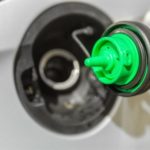Quick Navigation
There are a couple of reasons why you’ll hear noises and vibrations from your car when pressing on the gas pedal.
Most of these noises result from various faults that need to be addressed before they become significant issues that will cost you a fortune to repair or replace.

The following is a compilation of some of the noises that you might hear when accelerating, what they mean, and how to solve issues related to the noises.
Faulty Timing Belt Pulley Or Worn-Out Timing Belts
Timing belt pulleys are among the parts in constant use in your car, and they have to be regularly serviced.
If the pulleys on your engine are worn out, it is because of the friction from the belt, and you’ll need to replace the pulleys.
The timing belt will slip when you accelerate if you fail to replace the pulleys.
Suppose the timing belt pulleys are okay and are firmly mounted onto the engine. In that case, the sound could result from low tension between the belt and timing belt pulleys.
When the timing belt is installed incorrectly or is worn out, you’ll hear a high-pitched squealing noise coming from the engine.
Ensure that the timing belt is installed correctly and not worn out. You can also get the pulleys tensioned, especially if your car is old or in constant use.
Leaking Exhaust System
When pressing on the gas pedal when stationary or accelerating and you hear a loud hissing noise coming from the engine bay, it is most likely a leaking exhaust manifold.
If there is a small crack or dent on the manifold, the engine’s air will leak out, thus creating a loud hissing sound because of the high pressure.
A worn-out exhaust manifold gasket could also lead to a similar sound. Still, you’ll hear it when accelerating at high speeds.
Ensure you assess the condition of the exhaust manifold and the exhaust manifold gasket immediately when you hear a hissing sound coming from the engine bay.
Repairing an exhaust manifold is not recommendable. Instead, you should replace it and do the same if the exhaust manifold gasket is worn-out.
Worn Out Engine Bearings
The engine bearings hold the crankshaft as you accelerate or rev your car idle. If the engine bearings are worn out, the crankshaft is mispositioned.
When the crankshaft is mispositioned, the engine pistons rub against the engine block, thus producing a loud whirring sound when you place your foot on the gas pedal.
If your engine bearings are worn-out, you’ll hear a slight clunking sound first, mistaken for tire imbalance.
Ensure you get them checked, and if they are worn out, the mechanic should replace them before the pistons and the engine block is damaged.
Vacuum Leak
When accelerating, the engine needs more air to combust with more fuel, thus producing more power.
Air will pass through the air filter box and then into the engine at high pressure, typically a vacuum.
If there is any leak between the air filter box and the engine, air will leak, producing a hissing sound that gets louder as you press on the gas pedal.
The vacuum lines are made of rubber or plastic, which disintegrate with time due to the heat produced by the engine.
If you don’t have a replacement, patch up the leaks until you find a replacement.
Worn-out air intake gaskets also cause air leaks, thus producing a similar hissing sound when you put your foot to the pedal.
These are easily replaceable if you have some lying around.

Stuck Valves
The engine valves move up and down the cylinders controlling air and fuel entry in and out of the cylinders when the engine is on.
Over time, carbon deposits build up between the valve guides and the valves. One or two valves might get stuck.
You’ll hear a clicking sound when you start the engine, and it gets louder as you rev or accelerate.
Flushing the engine with a carbon deposit cleaning solution after removing the old oil removes carbon deposit in the valve guides.
To prevent carbon deposits from accumulating in the valve guides, mix the engine oil with a carbon deposit preventing solution or use engine oil that prevents carbon deposits from getting.
Faulty Engine Mounts
It is a common issue in older cars. You hear rumbling noises from underneath the engine when accelerating, and the sound gets worse at high speeds.
You’ll also notice vibrations that will cause the hood to move around if the issue is too bad.
Engine mounts are made out of rubber to absorb engine vibrations, and rubber wears out with time.
When the rubber mounts crack, the engine will incline to the side which the engine mount has some life in it.
When the engine is installed incorrectly and lies towards one side, the mount under a lot of weight will wear out quicker than the one with less weight on it.
You’ll have to get the engine removed and new engine mounts installed at every installation point.
When you install only one or two engine mounts, the one you’ll leave will wear out quicker, and you’ll be forced to repurchase all engine mounts.
Faulty Pistons Or Cylinders
If the pistons are worn out, there will be a larger clearance between the pistons and the cylinder walls.
When you accelerate or rev your engine, you’ll hear a knocking sound that gets louder as you press your gas pedal more.
Replacing the pistons is usually an easy fix, but check the cylinder walls before installing new pistons.
If the piston rings are loose, you’ll hear a ringing noise that gets louder as you press your gas pedal.
Retightening the rings and adding a few drops in each cylinder will solve this.
If the rings are broken, you’ll either have to get new rings or replace the pistons depending on the condition of the pistons.
Low Oil Levels In The Transmission
In automatic transmission cars, gear change does not require driver input; thus, the transmission is always ready to shift to a higher gear as you accelerate.
If there is low oil in the transmission, the internals will grind against each other, and you’ll hear a rumbling noise from the transmission as the gears change.
When the oil level is too low, you’ll feel vibrations, especially on the steering wheel and gas pedal.
Check the transmission oil level and if there are leaks, identify the source of the leak and get it fixed before driving your car.
Conclusion
When driving and you hear noises and vibrations, you should pull over then continue driving.
You can evaluate the issue of where the sound is coming from and determine whether you can continue going or not.
If you continue driving, you might cause more damage, resulting in more repairs and replacement costs.
If you are near a service station, slowly drive your car there or get it towed if you are nowhere near one.

Patrick started his love affair with cars in his childhood. Over the years, he claims a sturdy hold on his driving skills, along with a thorough understanding of cars. We can expect some interesting, holistic, and pleasurable blogs with his flair for writing and his love for cars.
Being a car enthusiast, Patrick has experience comprising of two decades in which he has ridden some of the meanest and strongest machines in the automotive industry. His previous avatars include an automotive professional, photographer, and journalist, and you will certainly experience the roundness of experience in his piece on this site.
In his second decade of reviewing cars and analyzing tools, Patrick is all set to give you convincing, reliable, and the latest information regarding what’s happening in the automotive industry. Currently, he owns a BMW Z3 but cannot get his eyes off Aston Martin DB5. He is a car enthusiast; he loves cooking and listening to music, especially jazz. Here are some of the pieces written by our ace author.

![Gas Gauge Goes Up And Down [Causes + Solutions] Gas Gauge Goes Up And Down [Causes + Solutions]](https://carsupercare.com/wp-content/uploads/2022/04/Gas-gauge-goes-up-and-down-Causes-and-Solutions.docx-150x150.jpg)




